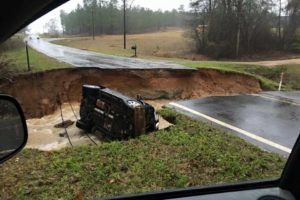Insurance payments and traditional federal aid programs won’t be enough to respond to the catastrophic flooding that ravaged tens of thousands of homes across south Louisiana, wrecking entire subdivisions and devastating entire cities.
Louisiana, once again, will be asking Congress to lend a hand to an ailing state.
But the state delegation lacks some of the seniority it once had, and stalemates in Congress have made it difficult to even get funding for a Zika virus response to final passage, raising worries that flood disaster aid may be hard to get.
Plus, several of Louisiana’s congressional members voted against a Superstorm Sandy relief package only a few years ago, which could make it an uncomfortable ask of colleagues to help their state now.
The full scope of the flood’s destruction is only starting to become clear as people rip out the insides of homes and deposit moldy carpets, soaked drywall, water-damaged furniture and heaps of personal belongings onto their front lawns.

Gov. John Bel Edwards estimates well over 100,000 homes took damage from the floodwaters. That doesn’t count ruined businesses, fire stations, schools and other public buildings.
State officials first will need a better tally of the devastation to make a case for congressional assistance. As a preliminary request, Edwards asked President Barack Obama during his Tuesday visit to push Congress for federal block grant aid.
“This was a one in a thousand year flood event, and most of the affected homeowners did not, nor were required to, have flood insurance,” the governor wrote in a follow-up letter handed to the President. “The (FEMA) individual assistance funds that will be available, while critical, will simply not be sufficient to allow our citizens to rebuild their homes.”
Obama said he’ll support the recovery effort, both through his oversight of existing federal aid programs and in urging further action from Congress.
“The whole country is going to continue to support you and help you until we get folks back in their homes and lives are rebuilt,” the President told Louisiana residents.
In trying to negotiate a relief package, Louisiana should be helped by the clout of U.S. Rep. Steve Scalise, R-Metairie, the third-ranking GOP member of the House. In a statement, Scalise called making sure that assistance is available to flood victims his “top priority.”
Congress isn’t currently in session, but members of the Louisiana delegation say they’ve started laying the groundwork for aid requests.
“We’re going to need some supplemental help,” said U.S. Rep. Charles Boustany, R-Lafayette, whose district had widespread damage. “I just don’t see any way out of it, when you have communities where 90 percent of homes were flooded.”
Beyond block grant money, Boustany expects the agriculture industry will need specific aid. He’s also looking at possible tax relief Congress could offer storm victims, like easing penalties for tapping into certain retirement accounts if people need the money to repair and rebuild.
Boustany, running for a Senate seat against U.S. Rep. John Fleming and 22 other opponents, said he’s concerned a vote that Fleming, Scalise and U.S. Sen. Bill Cassidy took against Sandy relief in 2013 may make it tougher for Louisiana to win support for flood aid.
“I warned members of our delegation and others who have experienced disaster that if you oppose Sandy relief you’re going to come across as being hypocritical and the next time we need help, we may not have it,” Boustany said.
Cassidy, R-Baton Rouge, said he voted for Sandy aid and has a track record of supporting disaster relief for states, but couldn’t support legislation bulked up with “pure pork which was unrelated to Sandy.” He said if his colleagues “vote against our folks” because of his Sandy vote, they are “deliberately misunderstanding” his position.
Fleming, R-Minden, offered a similar defense, saying he didn’t support final passage of some Sandy aid because a long list of spending unrelated to direct storm response was added.
“I support the appropriate use of federal funds to help when disaster strikes,” Fleming said in a statement.
Thousands of Louisiana residents will be waiting to see Congress’ reaction.
Was this article valuable?
Here are more articles you may enjoy.

 Dog-Related Injury Claim Payouts Hit $1.12B in 2023, Report Shows
Dog-Related Injury Claim Payouts Hit $1.12B in 2023, Report Shows  Property Restoration Industry: A Culture in Need of Repair?
Property Restoration Industry: A Culture in Need of Repair?  MGM Resorts Sues US FTC to Stop Investigation of Casino Hack
MGM Resorts Sues US FTC to Stop Investigation of Casino Hack  Johnson Controls Unit to Pay $750M to Settle ‘Forever Chemicals’ Lawsuit
Johnson Controls Unit to Pay $750M to Settle ‘Forever Chemicals’ Lawsuit 